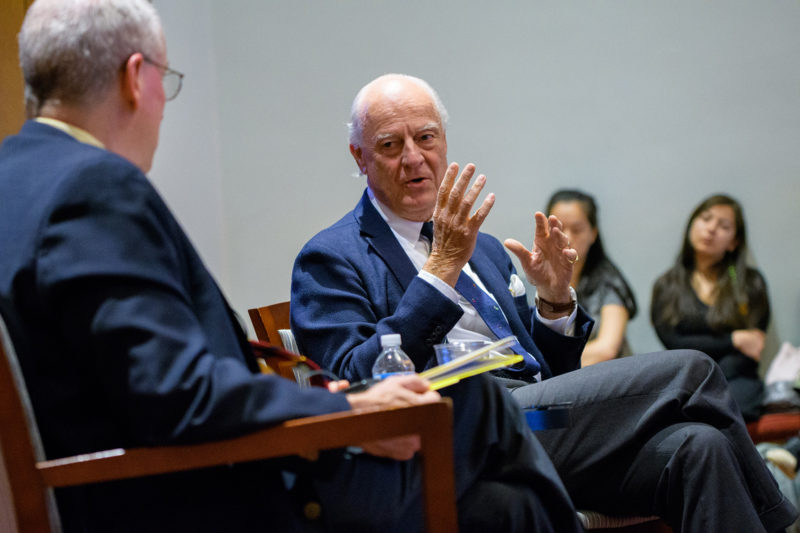Staffan de Mistura, former Undersecretary General of the UN and Special Representative for Syria, Iraq, and Afghanistan, and Robert Ford, former U.S. ambassador to Syria, discussed “Syria and the Crisis of World Order: Where Do We Go From Here?”
Two seasoned diplomats sat down for a timely discussion about the situation in Syria Oct. 23 in the Jackson Institute’s Horchow Hall.
Staffan de Mistura, former Undersecretary General of the UN and Special Representative for Syria, Iraq, and Afghanistan, and Robert Ford, Jackson Senior Fellow and former U.S. ambassador to Syria, addressed the topic, “Syria and the Crisis of World Order: Where Do We Go From Here?” in front of a standing-room-only crowd.
Ford and de Mistura first met years ago while both were serving in Iraq, and the rapport between them was evident in their conversation. During a career of over four decades with United Nations agencies, De Mistura served in numerous conflict zones, directing complex relief operations, food distributions and vaccination campaigns. Ford retired from the State Department in 2014 following a 30-year career, during which he received wide recognition for his work defending Syrians’ human rights in the face of the Bashar al-Assad regime’s repression.
The conversation was an insider’s account of the upheaval in Syria over the last eight years. De Mistura relayed an anecdote about a “magic moment” when a negotiated peace in Syria felt possible. All parties, including the U.S. and Russia, “had a common interest in finding a solution,” de Mistura said, and negotiations between Russian Foreign Minister Sergey Lavrov and former Sec. of State John Kerry extended into the early morning hours. “When you’re negotiating after midnight, it means you’re serious,” de Mistura quipped.
After those negotiations broke down following a military attack, Assad began to believe he could win the war in Syria without negotiating, de Mistura explained. “Assad has won a military victory, but he hasn’t won the peace,” Ford added, citing the state of Syria’s economy and the absence of a plan to reintegrate 5 million refugees who have fled their homeland.
Ford and de Mistura wrapped up their conversation and then took audience questions on a variety of topics, including the role of Turkey in Syria and what the future holds for young Syrians and their country. In response to the latter question, Ford offered a grim assessment: “it will take decades to rebuild. There is no happy ending, I’m afraid.”
The public talk was part of de Mistura’s three-day visit to Yale, during which he visited six Global Affairs classes and met with faculty and students. De Mistura was invited to take part in Jackson’s new Visiting Fellows Program being rolled out this fall. The program brings distinguished practitioners to Yale for an immersive multi-day program, highlighting their extraordinary contributions to global affairs. The Visiting Fellows enrich the Jackson and broader university community through attending classes, giving public talks, and interacting with students and faculty through a variety of engaging events.
Unlike the Jackson Senior Fellows program, in which distinguished practitioners spend a semester or more at Jackson teaching courses and mentoring students, the Visiting Fellows program allows practitioners to come to Yale for a much shorter stay. The program extends Jackson’s vibrant network of exceptional individuals deeply committed to global affairs, giving students more exposure to key figures in the field.
Learn more about the Visiting Fellows Program or see more photos from de Mistura’s time on campus on Facebook.
